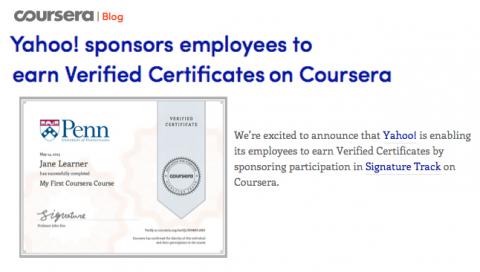
Many organizations offer prepackaged MOOCs, and this is a very good option for workplace skills, professional development, and other parts of a training program that don’t require company-specific content. The Saylor Foundation offers a Workplace Skills Program that includes courses in computer literacy, professional writing, and time and stress management.
To use these courses as part of a training program, simply have your employees take the courses online and then print out the certificates as proof of their completion – no additional training required.
Here are some other build-your-own-MOOC platforms to consider: Desire2Learn, ProProfs Training Maker, P2PU, and Google Course Builder (still in beta testing). You can also bypass the LMS altogether and set up the course as a wiki.
Another MOOC element that can be easily incorporated into a training program is working on collaborative documents to build an employee knowledge base. Many MOOCs have wikis that students can edit freely, which encourages them to share and collaborate. A wiki allows users to contribute their own knowledge and benefit from the knowledge of others, and the changes are instantaneous so there is no waiting for the system administrator to update the content.
If you are a Chief Human Resource Officer or a Chief Learning Officer, here are five questions to consider as you think about how MOOC’s can provide you the impetus to re-think and re-imagine your employer brand and corporate learning department.
- How can MOOCs build the employer brand by offering consumer education? Your employees will be able to receive updated education from one of the most important universities in the world. Your employees will be at the same level in some topics.
- What’s more important in learning: content or context? MOOCs’ universal nature is central to their existence. Bringing them into the company’s learning department inevitably means considering the context of training as well as the content.
- How can data analytics help you improve your learning programs? MOOCs offer real-time analytics that reveal each learner’s progress and what formats work best for your learners. As big data sweeps the HR & Corporate Learning functions, more Chief Learning Officers need to be prepared to use data analytics to enhance the overall learning experience.
- Can your company re-imagine the role of the learner? With MOOCs, the learner takes on a role more expansive than ever before, acting as teacher, learner, and peer reviewer.
- Could verified certificates mean huge reductions to your executive education budget? Millennials, who are projected to be 50% of the global workforce by 2020, are demanding more opportunities for learning & development credentials. MOOCs offer that - at a price point of under $100 for each certificate. Based on Yahoo! and Coursera’s partnership to train and credential Yahoo!’s software engineers for a fee, this could become the “new normal” for employees pursuing continuing education. That in turn would lead to budget re-allocations regarding how companies spend their continuing executive education budgets.
However they do it, companies will have to adapt MOOC elements or risk falling behind. Because as historian Norman Davies once said, “The one certainty for anyone in the path of an avalanche is this; standing still is not an option.”
source> https://www.forbes.com/sites/jeannemeister/2013/08/13/how-moocs-will-rev...
http://www.yourtrainingedge.com/using-moocs-in-corporate-training-programs/
